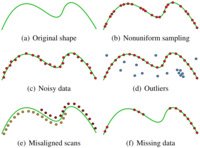A Survey of Surface Reconstruction from Point Clouds

|
The area of surface reconstruction has seen substantial progress in the past two decades. The traditional problem addressed by surface reconstruction is to recover the digital representation of a physical shape that has been scanned, where the scanned data contain a wide variety of defects. While much of the earlier work has been focused on reconstructing a piece-wise smooth representation of the original shape, recent work has taken on more specialized priors to address significantly challenging data imperfections, where the reconstruction can take on different representations--not necessarily the explicit geometry. We survey the field of surface reconstruction, and provide a categorization with respect to priors, data imperfections and reconstruction output. By considering a holistic view of surface reconstruction, we show a detailed characterization of the field, highlight similarities between diverse reconstruction techniques and provide directions for future work in surface reconstruction. |
[Project Website]
[DOI/EE link]
@article{BTSAGLSS16,
author = {Matthew Berger and Andrea Tagliasacchi and Lee M. Seversky and Pierre Alliez and Ga{\"{e}}l Guennebaud and Joshua A. Levine and Andrei Sharf and Cl{\'{a}}udio T. Silva},
ee = {http://dx.doi.org/10.1111/cgf.12802},
journal = {Computer Graphics Forum},
month = {2},
number = {1},
pages = {301--329},
title = {A Survey of Surface Reconstruction from Point Clouds},
volume = {36},
year = {2016}
}